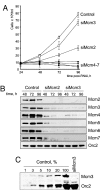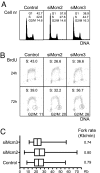Excess MCM proteins protect human cells from replicative stress by licensing backup origins of replication
- PMID: 18579778
- PMCID: PMC2449346
- DOI: 10.1073/pnas.0803978105
Excess MCM proteins protect human cells from replicative stress by licensing backup origins of replication
Abstract
The six main minichromosome maintenance proteins (Mcm2-7), which presumably constitute the core of the replicative DNA helicase, are present in chromatin in large excess relative to the number of active replication forks. To evaluate the relevance of this apparent surplus of Mcm2-7 complexes in human cells, their levels were down-regulated by using RNA interference. Interestingly, cells continued to proliferate for several days after the acute (>90%) reduction of Mcm2-7 concentration. However, they became hypersensitive to DNA replication stress, accumulated DNA lesions, and eventually activated a checkpoint response that prevented mitotic division. When this checkpoint was abrogated by the addition of caffeine, cells quickly lost viability, and their karyotypes revealed striking chromosomal aberrations. Single-molecule analyses revealed that cells with a reduced concentration of Mcm2-7 complexes display normal fork progression but have lost the potential to activate "dormant" origins that serve a backup function during DNA replication. Our data show that the chromatin-bound "excess" Mcm2-7 complexes play an important role in maintaining genomic integrity under conditions of replicative stress.
Conflict of interest statement
The authors declare no conflict of interest.
Figures





References
-
- Mendez J, Stillman B. Perpetuating the double helix: Molecular machines at eukaryotic DNA replication origins. BioEssays. 2003;25:1158–1167. - PubMed
-
- Lengronne A, Schwob E. The yeast CDK inhibitor Sic1 prevents genomic instability by promoting replication origin licensing in late G(1) Mol Cell. 2002;9:1067–1078. - PubMed
Publication types
MeSH terms
Substances
LinkOut - more resources
Full Text Sources
Other Literature Sources
Miscellaneous

